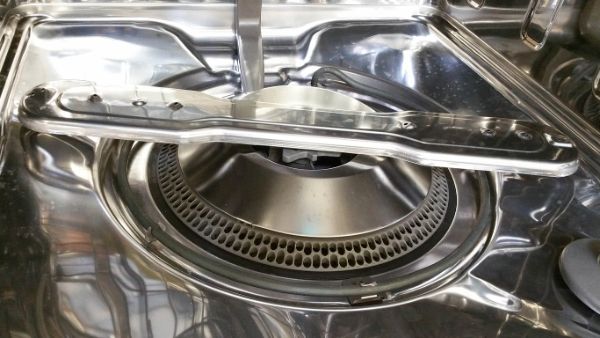Dishwashers have become an indispensable appliance in modern kitchens, saving us time and effort in cleaning dishes. However, not all dishwashers are created equal when it comes to effectively handling food particles and debris. Two common cleaning mechanisms found in dishwashers are the hard food disposer and filtration systems.
In this article we will talk about the differences between these two mechanisms and help you make an informed decision about which option is best suited for your needs.
Table of Contents
Hard Food Disposer
A dishwasher with a hard food disposer utilizes a grinding mechanism to break down and dispose of solid food particles. As water circulates through the dishwasher, the disposer grinds and pulverizes food debris, ensuring it is flushed out and not recirculated onto clean dishes.
One of the advantages of a hard food disposer is its ability to handle larger food scraps and tougher residues. This mechanism can be particularly beneficial for households that frequently deal with sticky or hard-to-remove food residues. However, it’s important to note that dishwashers with hard food disposers may require periodic maintenance to prevent clogs or malfunctions caused by large food particles.
Filtration System
Dishwashers equipped with filtration systems employ a different approach to handle food particles. Instead of grinding and disposing of food debris, these systems use filters to trap and remove solid particles from the water during the wash cycle.
Filtration systems typically consist of one or more filters that capture food particles and prevent them from reentering the dishwasher chamber. These filters need to be regularly cleaned or replaced, depending on the model, to maintain optimal performance. While filtration systems are generally effective in removing food residues, they may require more frequent maintenance compared to dishwashers with hard food disposers.
Performance and Efficiency
Both hard food disposers and filtration systems are designed to enhance cleaning performance and prevent food particles from redepositing on dishes. However, there are some differences in terms of efficiency and effectiveness.
Dishwashers with hard food disposers are known for their ability to handle larger food scraps and provide a more thorough cleaning. The grinding mechanism of the disposer ensures that solid particles are efficiently disposed of, leaving dishes spotless. However, it’s worth noting that dishwashers with hard food disposers may consume slightly more energy and water due to the additional grinding process.
On the other hand, filtration systems effectively capture food particles and prevent them from circulating during the wash cycle. These systems are generally energy-efficient and eco-friendly since they don’t require the extra power for grinding food particles. However, smaller food particles or debris that bypass the filters may still end up on dishes, albeit to a lesser extent.
Maintenance and Convenience
When considering the maintenance aspect, dishwashers with filtration systems may require more frequent attention. The filters need regular cleaning or replacement to prevent clogs and maintain optimal performance. This additional maintenance can be a minor inconvenience for some users.
In contrast, dishwashers with hard food disposers typically require less regular maintenance, as the grinding mechanism helps prevent clogs. However, it’s important to periodically inspect and clean the disposer to ensure its smooth operation.
Conclusion
Choosing between a dishwasher with a hard food disposer or a filtration system depends on your specific needs and preferences. Dishwashers with hard food disposers excel at handling larger food scraps and tougher residues, offering thorough cleaning performance. On the other hand, dishwashers with filtration systems are efficient and require less maintenance, albeit with a focus on capturing smaller particles.
Consider your typical food residues, the size of your household, and your personal cleaning preferences when making a decision. It’s also helpful to read customer reviews and compare dishwasher models to find the one that best aligns with your needs.
If you frequently deal with larger food scraps or have a busy household with tough-to-remove residues, a dishwasher with a hard food disposer might be the ideal choice for you. The grinding mechanism will ensure efficient disposal of solid particles, providing thorough cleaning results.
On the other hand, if you prioritize ease of maintenance and energy efficiency, a dishwasher with a filtration system may be more suitable. While it may require regular cleaning or filter replacement, the system effectively captures food particles and prevents them from redepositing on your dishes.
Ultimately, both hard food disposers and filtration systems offer effective cleaning solutions for different needs. Assess your specific requirements, consider factors such as maintenance, cleaning performance, and energy efficiency, and choose the option that best fits your preferences.
Before making a purchase, research different dishwasher models, compare specifications, and read customer reviews to gain insights into their performance and reliability. Additionally, take into account your budget and the available space in your kitchen to ensure a seamless integration of the chosen dishwasher.
In conclusion, the choice between a dishwasher with a hard food disposer and one with a filtration system depends on your cleaning priorities and preferences. Both mechanisms have their advantages and considerations, so it’s important to evaluate your specific needs and choose accordingly. Whichever option you select, a well-chosen dishwasher will make your dishwashing experience more convenient and efficient, allowing you to enjoy sparkling clean dishes with ease.

